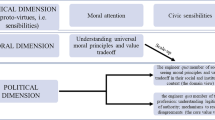Abstract
Perhaps the most common reason science and engineering faculty give for not including “ethics” (that is, research ethics, engineering ethics, or some discussion of professional responsibility) in their technical classes is that “there is no room”. This article 1) describes a technique (“micro-insertion”) that introduces ethics (and related topics) into technical courses in small enough units not to push out technical material, 2) explains where this technique might fit into the larger undertaking of integrating ethics into the technical (scientific or engineering) curriculum, and 3) concludes with some quantified evidence (collected over more than a decade) suggesting success. Integrating ethics into science and engineering courses is largely a matter of providing context for what is already being taught, context that also makes the material already being taught seem “more relevant”.
Similar content being viewed by others
References
Davis, Michael. (1993) “Ethics Across the Curriculum: Teaching Professional Responsibility in Technical Courses”, Teaching Philosophy 16 (September): 205–235.
Acharya, Muchund, Davis, Michael, and Weil, Vivian. (1995) “Integrating Ethics into an Undergraduate Research Experience”, Journal of Engineering Education 84 (April): 129–132.
Davis, Michael. (1997) “Developing and Using Cases to Teach Practical Ethics”, Teaching Philosophy 20 (December): 353–385.
Davis, Michael. (2004) “Five Kinds of Ethics Across the Curriculum: An Introduction to Four Experiments with One Kind”, Teaching Ethics 4 (Spring): 1–14.
Davis, Michael. (2002) Profession, Code, and Ethics. Ashgate, Aldershot, England.
Davis, Michael. (1997) “Is There a Profession of Engineering?” Science and Engineering Ethics 3 (October): 407–428.
Davis, Michael. (1998) Thinking like an Engineer: Essays in the Ethics of a Profession. Oxford University Press, New York.
Rest, James. (1985) “The Major Components of Morality” in Morality in Moral Development, and Moral Behavior, Kurtines, W. and Gewirtz, J. eds. Wiley, New York, pp, 24–38.
Bebeau, Muriel. (1993) “Designing an Outcome-Based Ethics Curriculum on Moral Reasoning: Strategies and Evidence of Effectiveness”, Journal of Moral Education 22 (1993): 313–326.
Bebeau, M., Rest, J., Narvaez, D. (1999) Beyond the Promise: A Perspective for Research in Moral Education, Educational Researcher 28, 4: 18–26.
Whitbeck, Caroline. (1995) “Teaching Ethics to Scientists and Engineers: Moral Agents and Moral Problems”, Science and Engineering Ethics. 1:3: 299–308.
Institute of Medicine, National Research Council of National Academies. (2002) Integrity in Scientific Research, National Academies Press: Washington, DC.
Ethics Bowl, http://www.iit.edu/departments/csep/EB/eb1.html.
Moran, Michael J. and Shapiro, Howard N. (1992) Fundamentals of Engineering Thermodynamics, 2nd edition, John Wiley & Sons, New York. Problem 10.21.
Author information
Authors and Affiliations
Corresponding author
Rights and permissions
About this article
Cite this article
Davis, M. Integrating ethics into technical courses: Micro-insertion. SCI ENG ETHICS 12, 717–730 (2006). https://doi.org/10.1007/s11948-006-0066-z
Received:
Revised:
Accepted:
Issue Date:
DOI: https://doi.org/10.1007/s11948-006-0066-z



